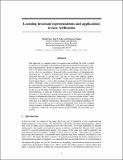Learning invariant representations and applications to face verification
Author(s)
Liao, Qianli; Leibo, Joel Z.; Poggio, Tomaso A.
DownloadPoggio_Learning invariant representations3.pdf (1.607Mb)
OPEN_ACCESS_POLICY
Open Access Policy
Creative Commons Attribution-Noncommercial-Share Alike
Terms of use
Metadata
Show full item recordAbstract
One approach to computer object recognition and modeling the brain's ventral stream involves unsupervised learning of representations that are invariant to common transformations. However, applications of these ideas have usually been limited to 2D affine transformations, e.g., translation and scaling, since they are easiest to solve via convolution. In accord with a recent theory of transformation-invariance, we propose a model that, while capturing other common convolutional networks as special cases, can also be used with arbitrary identity-preserving transformations. The model's wiring can be learned from videos of transforming objects---or any other grouping of images into sets by their depicted object. Through a series of successively more complex empirical tests, we study the invariance/discriminability properties of this model with respect to different transformations. First, we empirically confirm theoretical predictions for the case of 2D affine transformations. Next, we apply the model to non-affine transformations: as expected, it performs well on face verification tasks requiring invariance to the relatively smooth transformations of 3D rotation-in-depth and changes in illumination direction. Surprisingly, it can also tolerate clutter transformations'' which map an image of a face on one background to an image of the same face on a different background. Motivated by these empirical findings, we tested the same model on face verification benchmark tasks from the computer vision literature: Labeled Faces in the Wild, PubFig and a new dataset we gathered---achieving strong performance in these highly unconstrained cases as well."
Date issued
2013Department
Massachusetts Institute of Technology. Department of Brain and Cognitive Sciences; Massachusetts Institute of Technology. Department of Electrical Engineering and Computer Science; McGovern Institute for Brain Research at MITJournal
Advances in Neural Information Processing Systems (NIPS)
Publisher
Neural Information Processing Systems Foundation
Citation
Liao, Qianli, Joel Z. Leibo, and Tomaso Poggio. "Learning invariant representations and applications to face verification." Advances in Neural Information Processing Systems 26 (NIPS 2013).
Version: Author's final manuscript
ISSN
1049-5258